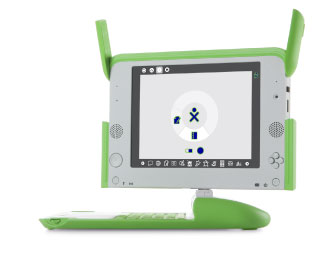 Over at the NY Times, I took in a reading about the OLPC Project and some stumbles and successes that it has had. One of the more interesting things about that project, at least in light of the small summary that the NYT offers, is that for all of the success that it didn’t have in terms of shipments, it has had number of smaller (many times unintended) victories. Let’s look at a few lessons and glean some understanding (Proverbs 4:6-8):
Over at the NY Times, I took in a reading about the OLPC Project and some stumbles and successes that it has had. One of the more interesting things about that project, at least in light of the small summary that the NYT offers, is that for all of the success that it didn’t have in terms of shipments, it has had number of smaller (many times unintended) victories. Let’s look at a few lessons and glean some understanding (Proverbs 4:6-8):
…To make a very long, very complicated story short, since the initial frenzy subsided, OLPC has concentrated on the logistics of shipping a total of 2.3 million laptops to some 45 countries. It has also worked on ways to improve the performance and maintenance of those machines, and on developing a new tablet computer, the XO-3, which it hopes to introduce late next year…
Logistics planning and execution is important: One of the issues that we ran into when walking through the planning stages for the Kiosk Evangelism Project is that while we were directed for the goals of the program, understanding the issues on the ground to distribute content, training, and administrative support were a lot harder to notch. Ideally, such issues are best solved not on the run but with mind of persons and organizations who are skilled in those functions.
…OLPC’s machines have also proved effective when used on a smaller scale. “We’ve deployed them in a couple of schools with great results,” said Cameron Sinclair, co-founder of Architecture for Humanity, a global volunteer network, which specializes on development and disaster relief projects, although he added that other schools preferred to use traditional PCs…
Small scale, predispositions to other behaviors/methods: Its not an accident that investing technological (tools) changes into a culture can be challenge. Don’t be afraid to take steps back from a larger implementation so that you can see some more detailed usages from smaller groups. In going to that smaller-deployment/implementation route, you will notice that behavioral/cultural preferences might arise for or against your efforts. With small scale, you can address this. If the scale is large, you might get that kind of push-back and then refactor your entire plan, when only a small section needs to be addressed.
…Similarly, the praise for the design of OLPC’s cute little laptop has helped the computer industry to develop a lucrative new global market for tablets and other small computers…
Unintended market effects: It wasn’t the intention of the OLPC project to create a new cottage industry (low-cost, accessible netbooks came expressly from the successes that the OLPC Project was making in non-Windows/Intel streams). But, it not just had the effect of opening up new usages, but spreading that usage’s best points (better device design, power efficiency gains, lower prices, etc.) to the larger notebook/PC market – effectively raising the bar for what it is we purchase. Your project might cause similar. Resist the urge to try and control those effects. If anything, be more streadfast towards your goals so that the baramometer of success for those other market effects has its own bar to reach.
…That said, OLPC has encountered difficulties, and its designers have had to modify the original laptops since they went into daily use in schools. The shiny plastic on the case was replaced by a tougher rubberized material. The keyboard was strengthened with a steel plate, and its lights removed to reduce energy consumption. OLPC had to add little feet to the machines used in countries like Nigeria, where school desks tended to be slanted. It has also trained local technicians to repair the laptops, rather than running a centralized maintenance program…
Planning is good; itertative changes is better: One of the more frustrating moments in any project is when you’ve had some kind of change in the roadmap. Maybe that’s a move to another tool, another type of final project, or even the additon of pieces which you didn’t origianlly see. For instance, in that same Kiosk Evangelism Project referenced above, before settling on a Wi-Fi Router/HD combo device, we’d looked at traditional ATM-like kiosks, web distribution, several types of content management approaches, and even using a mobile as a server to distribute the content. Each of those pieces were iterations to the current implementation of the project, and had to be gone through, even if they weren’t all within the original plan for that project.
Some years ago, we opined that the OLPC Project could be a beneficial tech-mission engagement. We’ve since talked about that kind of opportunity amongst others. If that were an opportunity taken on, there would have been these challeges and lessons learned. There would have been some notable successes. And probably a few failures. But, it would have produced the kind of understanding that – when fed back to the rest of the Body – would have created some needed wisdom points.